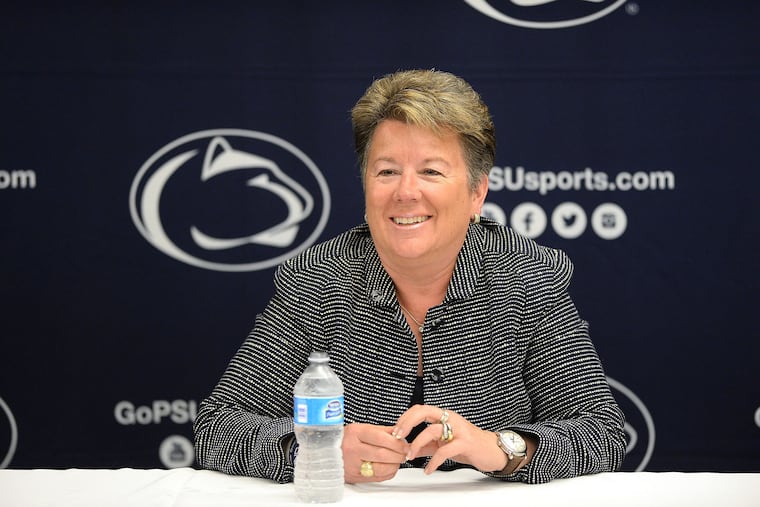Penn State’s Sandy Barbour says she and James Franklin are aligned on what needs to be done to succeed in football
The university's vice president for athletics said her conversations with Franklin during this summer's contract negotiations were "very good" and focused on investment in the football program.

TAMPA, Fla. – Penn State vice president of athletics Sandy Barbour discussed Thursday the new contract signed last month by James Franklin and said that she and the head coach were aligned in their vision for the football program.
Speaking at Tampa’s Jesuit High School, a short walk from the practice field where the Nittany Lions continued preparations for Saturday’s Outback Bowl against No. 22 Arkansas, Barbour talked about the negotiations that resulted in the Nov. 23 announcement that Franklin had agreed to a 10-year, $75 million extension.
» READ MORE: Penn State's James Franklin discusses players opting out of Outback Bowl
Barbour said the conversations between her and Franklin were “really good” and focused on how the two of them saw the university’s investment in the football program. She said those talks began shortly after she accepted the job as athletic director in July of 2014.
“It’s things we’ve either checked off the list or that we needed to continue to work on,” she said. “I don’t think there was anything that was a surprise to either of us. It was just about, what’s the plan? How do we make sure that we’re investing in a way that is going to result in the success and the development of student-athletes that we all want?”
Starting July 1, Penn State will bring in a new president, Neeli Bendapudi, the first woman and first person of color in that position, to succeed Eric J. Barron.
Barbour said that Barron has been aligned with her and Franklin over his eight-year tenure and they have seen “success and the investments for success very similarly.” She indicated she’s had some conversations with the new president and added, “I expect to continue to have 100% alignment.”
When asked about the importance in giving Franklin such a lucrative contract, Barbour spoke of “what his values are, what his fit for us, how he’s developed student-athletes and, oh by the way, we’ve also won a lot of football games,” specifically mentioning the Nittany Lions’ 42 victories from 2016 through 2019.
“I think his body of work really spoke to me and spoke to the leadership of the campus,” she said, “and we wanted to send a signal to him, and we wanted to send a signal to everybody else how much he’s appreciated. He’s our guy.
“Penn State’s a place where we feel very comfortable with leadership over long sustained periods of time. … When you’ve got a good one, it’s really, really positive, and I think Penn State has historically benefited from that.”
The Nittany Lions have not matched the success of the 2016-19 period over the last two seasons, compiling an 11-10 record in 2020 and 2021. Franklin’s record over his 100 Penn State games is 67-33 (.670) heading into Saturday’s bowl game.
» READ MORE: Safety Ji’Ayir Brown ready to take his place as the quarterback of the Penn State secondary
Before he agreed to his new contract, Franklin frequently had talked about the need to “compete 365 days a year with what everybody’s doing” in major college football, the constant drive to improve and enhance practice and training facilities. Some of his comments sounded as if he were unhappy with the university’s commitment.
That includes the upgrading of the Lasch Football Building. Barbour said “the biggest piece” of that project is currently under construction, most prominently the renovation of the weight room. But there are also areas of student development such as academic support, housing and assisting with name, image and likeness opportunities.
Barbour said between one-quarter and one-third of student-athletes are engaged with NIL but added there is a long way to go.
“I think where we need to continue to evolve,” she said, “is to really educate our alumni, educate our base, on what it is, what it’s not, and how important it is to the process, whether it’s the process of current student-athletes and their educational and financial benefit, but also obviously to recruit.
“I’m very pleased with how it’s gone. I think the student-athletes who have participated have really gained a lot of experience, knowledge, education, and put some money in their pockets as well.”